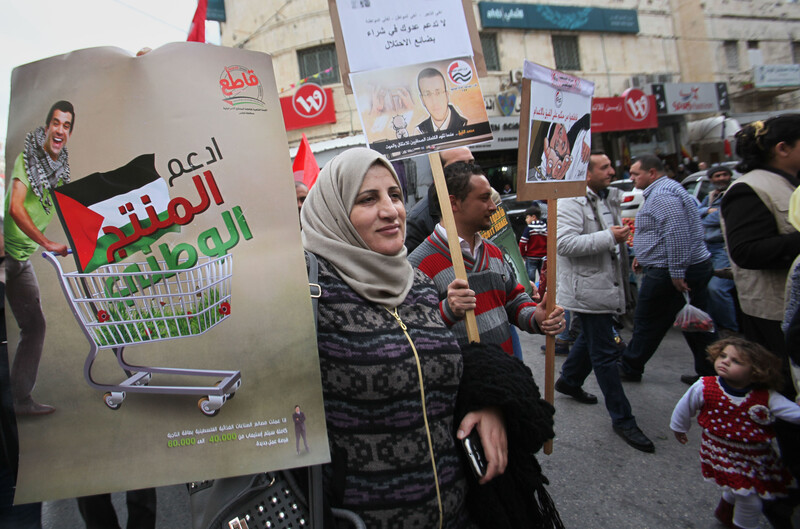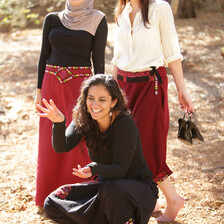The Electronic Intifada Nazareth 14 March 2016

Palestinians call for a boycott of Israeli goods in the West Bank city of Nablus in February.
APA imagesHow can you boycott Israel when you live there?
For a number of years, Palestinian citizens of Israel have been grappling with this question. In 2012, guidelines were published on how to support the growing boycott, divestment and sanctions (BDS) movement in support of Palestinian rights. But Israel’s repression, including attempts to criminalize BDS activities, prevented it from making a significant impact.
In late February, the first such conference about how the 1.6 million Palestinian citizens of Israel can take part in the BDS movement was held in Nazareth.
“Palestinian citizens of Israel have an important role in the BDS movement but we haven’t figured out what exactly that role is yet,” said Raya Naamneh, one of the event’s organizers. “So we are hoping to open up the discussion.”
Shunning Israeli goods or companies entirely is impossible for many Palestinian citizens of the country. Often there are no alternatives available to buying Israeli groceries or to taking jobs with Israeli employers.
To compensate for being unable to take part fully in an economic boycott, it was suggested that Palestinians in Israel could instead focus on advancing the academic and cultural boycott of Israel.
Discrimination
Raja Zaatry, a founding member of the BDS 48 Committee, recommended, for example, that Palestinians undertake a campaign against Ariel University.
An Israeli institution in the occupied West Bank, it tries to present a false picture of itself. By highlighting how a few hundred Palestinians study there, the university tries to distract from its involvement in a colonization process that denies Palestinians their basic rights.
Present-day Israel is simply known as “48” to Palestinians within it; “48” refers to 1948, the year Israel was established amid the Nakba, the forced displacement of approximately 750,000 Palestinians.
The Palestinians who continued living in Israel after its imposition have faced systematic discrimination. Ending that discrimination was one of the core demands made by the Palestinian BDS call, which was launched in 2005.
A new paper by Adalah, a group defending the rights of Palestinians in Israel, indicates that the situation is worsening. The paper lists a number of new measures designed to step up the repression against Palestinians who resist Israel’s apartheid policies.
Among them are “stop and frisk” rules that give Israeli forces extra powers to harass Palestinians and mandatory prison sentences for those convicted of stone-throwing or similar acts.
Threats
BDS activists have also been targeted by Israel’s repressive measures in the recent past. In 2011, Israel placed an anti-BDS law on its statute books. The law makes calling for a boycott against Israel a criminal offense. It also allows firms and institutions to sue and seek compensation from those urging a boycott.
Although no litigation has been carried out under the law, it has had a chilling effect on freedom of expression within Israel.
That was clear ahead of the Nazareth conference. The police threatened its organizers and the owner of the venue where it took place received hostile phone calls.
Raya Naamneh predicted that such tactics will continue. She said that the police would probably identify people who played a prominent role in the conference and “keep an eye” on them.
But BDS campaigners are determined not to be bullied into silence.
Najwan Berekdar, another conference organizer, said that Palestinian citizens of Israel no longer feel as isolated as they once did. The Palestinian community in Israel is “an inseparable part of the Palestinian society and struggle,” he told The Electronic Intifada.
Normalization debate
The Nazareth conference won support from Palestinian politicians.
“Boycott is a response to the occupation and serious discrimination,” said Muhammad Barakeh, a former member of Israel’s parliament, the Knesset. “It is a legitimate method of nonviolent resistance.”
One of the topics that was hotly debated during the event was whether Palestinians should stand for election to the Knesset. Some Palestinians feel that doing so helps “normalize” injustice.
However, there is no consensus among Palestinians in Israel about boycotting Knesset elections. This is one of several issues on which more work is required.
Although it will undoubtedly encounter obstacles, this work will continue. Palestinian citizens of Israel are determined to play an active role in the BDS movement, just as they are inseparable from the wider Palestinian struggle for freedom.
Yara Hawari is a final year PhD candidate at the University of Exeter She lives in occupied East Jerusalem.





